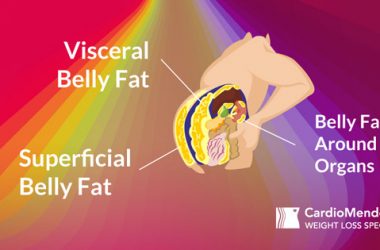Millions around the globe challenge themselves and strive to achieve sustainable weight loss and maintain optimal health. Beyond regular exercise and diet changes, understanding how hormones affect weight loss could be the key to your success.
At CardioMender, MD, Weight Loss Specialists, we provide customized medical weight loss solutions that identify and address the root cause responsible for weight gain to help our patients achieve healthier lifestyles. Read on as we explore the role of hormones in weight loss, providing valuable insights and practical tips to help you achieve your weight loss goals.
How Hormones Affect Fullness and Hunger
Working hard to lose weight without noticeable results can be frustrating and cause many to give up on their weight loss journey. In many cases, it’s not anyone’s fault for lack of progress. Learning the roles of hormones that control hunger can be the missing piece of the puzzle.
Hunger Hormones & Their Functions
Understanding the role of hormones in regulating hunger and fullness is crucial for achieving and maintaining weight loss goals. Learn about their functions and how they can impact your weight loss efforts.
- Ghrelin: Grelin is often referred to as the ‘hunger hormone’ This hormone is produced in the stomach and signals the brain to increase appetite. Elevated Ghrelin levels have been linked to weight gain and increased body fat.
- Motilin: This hormone is released during fasting periods and stimulates contractions in the digestive system, leading to increased hunger.
- Neuropeptide Y (NPY): NPY is a neurotransmitter that stimulates appetite and increases food intake. High levels of NPY have been associated with increased calorie intake, decreases energy utilization, increases fat storage and weight gain.
- Agouti-related protein (AgRP): AgRP is a neuropeptide that acts on a part of the brain called the hypothalamus to increase appetite and promote energy storage. Elevated AgRP levels have been linked to obesity and weight gain.
Satiety (Fullness) Hormones & Their Functions
Satiety hormones play a vital role in regulating appetite and promoting feelings of fullness. Similar to hunger hormones, when they are out of balance, they can severely impact your weight loss efforts or make it challenging to maintain weight.
- Insulin: Insulin is a hormone the pancreas produces that regulates blood sugar levels. High levels of insulin can lead to increased hunger and weight gain.
- Glucagon-like peptide-1 (GLP-1): GLP-1 is released in response to food and stimulates insulin production while slowing down stomach emptying, leading to increased feelings of fullness and decreased appetite. GLP-1 agonists such as semaglutide, marketed under the names of ozempic and wegovy are medications that mimic the action of GLP-1 and have been shown to be effective for achieving weight loss as well as treating type-2 diabetes…. please also link to blogs)
- Leptin: Leptin is a hormone produced by fat cells that signals the brain to decrease appetite and increase energy expenditure. Low levels of Leptin have been associated with increased appetite and weight gain.
- Cholecystokinin (CCK): This hormone is released in response to food in the small intestine and signals the brain to decrease appetite, increase feelings of fullness and aids with digestion.
- Pancreatic peptide YY (Peptide YY): This hormone is released by cells in the small intestine and signals the brain to reduce appetite and increase feelings of fullness.
- Obestatin: Obestatin is a hormone produced in the stomach that may regulate appetite and body weight. Its effects on appetite and weight regulation are still being studied.
Understanding How Hormones Affect Obesity
Hormones are essential for regulating body weight, and their imbalance can lead to obesity. Explore the links between obesity and common hormones, and learn how they can impact weight and health.
How Leptin Affects Obesity
Leptin is a hormone produced by fat cells that signal the brain to decrease appetite and increase energy expenditure. However, obese individuals can develop leptin resistance, causing the brain to ignore its signals and result in difficulty losing weight. People with leptin resistance have high levels of leptin that is effective as suppressing appetite.
How Insulin Affects Obesity
Insulin is a hormone produced by the pancreas that regulates blood sugar levels. In obese individuals, cells can become resistant to insulin, causing the pancreas to produce more insulin in an attempt to regulate blood sugar, leading to increased hunger and weight gain. Lowering insulin levels through implementing a low glycemic diet and exercise can help promote weight loss.
How Sex Hormones Affect Obesity
Sex hormones, such as estrogen and testosterone, play a role in regulating body weight. In obese individuals, excess body fat can lead to changes in sex hormone levels, causing further weight gain. Implementing lifestyle changes and in specific circumstances hormone replacement can help restore balance and promote healthy weight loss.
Obesity Hormones: Risk Factors for Disease
Obesity is a significant risk factor for numerous health problems, including type 2 diabetes, high blood pressure, heart disease, stroke, sleep apnea, and certain types of cancer. The imbalanced levels of hormones that contribute to obesity can increase the risk of these health issues. For example, high insulin levels can lead to insulin resistance, a precursor to type 2 diabetes. High insulin levels also promote inflammation.
Excess body fat can also cause inflammation, damaging blood vessels and leading to coronary artery disease and stroke. Additionally, the hormones released by adipose tissue can promote the growth of certain types of cancer cells. Maintaining a healthy weight through proper diet, exercise, and hormone balance can help reduce the risk of these adverse health consequences.
Behavior and Obesity Hormones
Crash dieting or severely restricting calories quickly can lead to rapid weight loss, but it is not an effective long-term weight loss strategy. This is because the body responds to sudden calorie restriction by slowing down the metabolism to conserve energy, making it harder to lose weight and easier to regain it. Additionally, extreme crash dieting can cause nutrient deficiencies and muscle loss, which can be harmful to overall health.
Clinically-guided weight loss programs, on the other hand, focus on sustainable lifestyle changes, such as healthy eating habits and regular exercise, which can promote gradual and long-term weight loss while maintaining muscle mass and nutrient balance.
Get Started with CardioMender, MD, to Gain Control of Your Weight Today!
Understanding how hormones affect weight loss can be a breakthrough in achieving your weight loss goals. It’s crucial to approach weight loss safely and with a customized plan that takes into account your unique health needs and goals.
At CardioMender, MD, Weight Loss Specialists, we’re committed to providing personalized weight loss programs that prioritize your health and well-being. Contact us today to learn how we can help you enjoy effective weight loss. Let us be your partner on the path to a healthier you!
Image source: Africa Studio on Shutterstock






